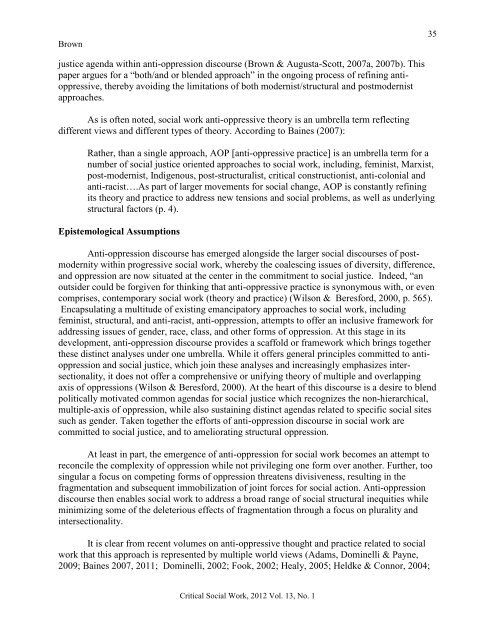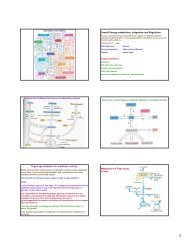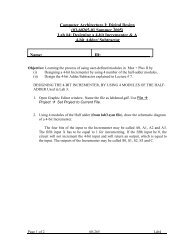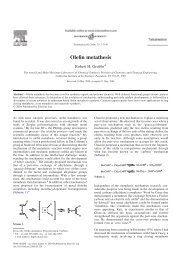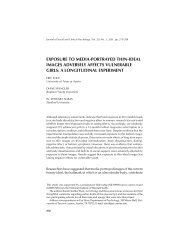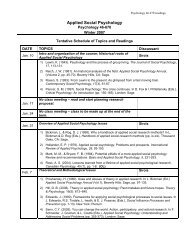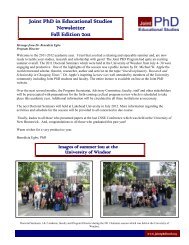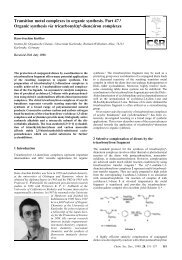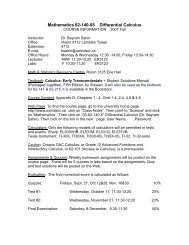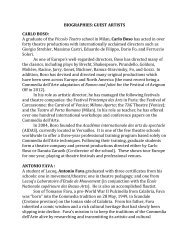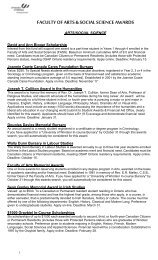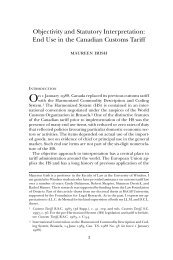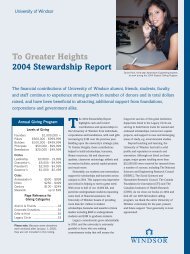Critical Social Work - University of Windsor
Critical Social Work - University of Windsor
Critical Social Work - University of Windsor
You also want an ePaper? Increase the reach of your titles
YUMPU automatically turns print PDFs into web optimized ePapers that Google loves.
Brown<br />
justice agenda within anti-oppression discourse (Brown & Augusta-Scott, 2007a, 2007b). This<br />
paper argues for a “both/and or blended approach” in the ongoing process <strong>of</strong> refining antioppressive,<br />
thereby avoiding the limitations <strong>of</strong> both modernist/structural and postmodernist<br />
approaches.<br />
As is <strong>of</strong>ten noted, social work anti-oppressive theory is an umbrella term reflecting<br />
different views and different types <strong>of</strong> theory. According to Baines (2007):<br />
Rather, than a single approach, AOP [anti-oppressive practice] is an umbrella term for a<br />
number <strong>of</strong> social justice oriented approaches to social work, including, feminist, Marxist,<br />
post-modernist, Indigenous, post-structuralist, critical constructionist, anti-colonial and<br />
anti-racist….As part <strong>of</strong> larger movements for social change, AOP is constantly refining<br />
its theory and practice to address new tensions and social problems, as well as underlying<br />
structural factors (p. 4).<br />
Epistemological Assumptions<br />
Anti-oppression discourse has emerged alongside the larger social discourses <strong>of</strong> postmodernity<br />
within progressive social work, whereby the coalescing issues <strong>of</strong> diversity, difference,<br />
and oppression are now situated at the center in the commitment to social justice. Indeed, “an<br />
outsider could be forgiven for thinking that anti-oppressive practice is synonymous with, or even<br />
comprises, contemporary social work (theory and practice) (Wilson & Beresford, 2000, p. 565).<br />
Encapsulating a multitude <strong>of</strong> existing emancipatory approaches to social work, including<br />
feminist, structural, and anti-racist, anti-oppression, attempts to <strong>of</strong>fer an inclusive framework for<br />
addressing issues <strong>of</strong> gender, race, class, and other forms <strong>of</strong> oppression. At this stage in its<br />
development, anti-oppression discourse provides a scaffold or framework which brings together<br />
these distinct analyses under one umbrella. While it <strong>of</strong>fers general principles committed to antioppression<br />
and social justice, which join these analyses and increasingly emphasizes intersectionality,<br />
it does not <strong>of</strong>fer a comprehensive or unifying theory <strong>of</strong> multiple and overlapping<br />
axis <strong>of</strong> oppressions (Wilson & Beresford, 2000). At the heart <strong>of</strong> this discourse is a desire to blend<br />
politically motivated common agendas for social justice which recognizes the non-hierarchical,<br />
multiple-axis <strong>of</strong> oppression, while also sustaining distinct agendas related to specific social sites<br />
such as gender. Taken together the efforts <strong>of</strong> anti-oppression discourse in social work are<br />
committed to social justice, and to ameliorating structural oppression.<br />
At least in part, the emergence <strong>of</strong> anti-oppression for social work becomes an attempt to<br />
reconcile the complexity <strong>of</strong> oppression while not privileging one form over another. Further, too<br />
singular a focus on competing forms <strong>of</strong> oppression threatens divisiveness, resulting in the<br />
fragmentation and subsequent immobilization <strong>of</strong> joint forces for social action. Anti-oppression<br />
discourse then enables social work to address a broad range <strong>of</strong> social structural inequities while<br />
minimizing some <strong>of</strong> the deleterious effects <strong>of</strong> fragmentation through a focus on plurality and<br />
intersectionality.<br />
It is clear from recent volumes on anti-oppressive thought and practice related to social<br />
work that this approach is represented by multiple world views (Adams, Dominelli & Payne,<br />
2009; Baines 2007, 2011; Dominelli, 2002; Fook, 2002; Healy, 2005; Heldke & Connor, 2004;<br />
<strong>Critical</strong> <strong>Social</strong> <strong>Work</strong>, 2012 Vol. 13, No. 1<br />
35


